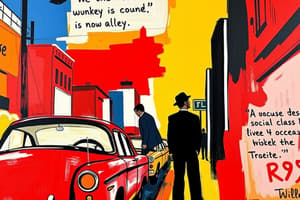Podcast
Questions and Answers
What does Stanley represent in A Streetcar Named Desire?
What does Stanley represent in A Streetcar Named Desire?
New middle class in America, the Antagonist in the play, represents irrationality of Dionysus in Greek mythology, social mobility of the American Dream, and hegemonic masculinity.
What does the name Stanley mean?
What does the name Stanley mean?
It means 'stone', hard and resistant to emotion.
Describe Stanley's appearance.
Describe Stanley's appearance.
Strongly and compactly built, roughly dressed in blue denim work clothes.
What does Freudian reading suggest about Stanley?
What does Freudian reading suggest about Stanley?
What is a quote from Stanley that indicates his sense of authority?
What is a quote from Stanley that indicates his sense of authority?
What quote reflects Stanley's confidence?
What quote reflects Stanley's confidence?
What quote from Stanley shows his response to authority?
What quote from Stanley shows his response to authority?
What aggressive action does Stanley take in the stage directions?
What aggressive action does Stanley take in the stage directions?
How does critic Robert Brustein describe Stanley's sexuality?
How does critic Robert Brustein describe Stanley's sexuality?
What quotes signify Stanley's lack of respect?
What quotes signify Stanley's lack of respect?
What quote does Stanley use to assert his power?
What quote does Stanley use to assert his power?
What lexis in the stage directions indicates Stanley's aggressive nature?
What lexis in the stage directions indicates Stanley's aggressive nature?
What quote expresses Stanley's possessive nature?
What quote expresses Stanley's possessive nature?
Flashcards are hidden until you start studying
Study Notes
Stanley in A Streetcar Named Desire
- Represents the new middle class in America, embodying hegemonic masculinity and the antagonist role.
- Reflects the irrationality of Greek mythology's Dionysus, asserting power and dominance.
- Illustrates social mobility through his marriage to Stella, who comes from a higher class.
Meaning of the Name
- The name "Stanley" derives from "stone," symbolizing hardness and emotional resistance, traits evident in his character.
Physical Appearance
- Described as "strongly, compactly built" and "roughly dressed in blue denim work clothes."
- The color blue symbolizes masculinity and his lower-class status compared to Blanche, accentuating class differences.
- Identified as a "gaudy seed-bearer," reflecting tastelessness.
Freudian Interpretation
- Represents the id in Freudian psychology, driven by basic animal instincts and the pleasure principle.
- Demonstrates impulsive behavior, as shown in actions like "stalking furiously" and turning off the radio.
Quotes Reflecting Power and Confidence
- Asserts dominance with, "I am the king around here, so don't forget it."
- Confidence is encapsulated in the motto, "Be comfortable is my motto."
Societal Dynamics
- Challenges authority with "Since when do you give me orders?" showcasing societal expectations and resistance.
- His aggressive behavior is depicted through violent stage directions: "hurls his plate to the floor," and "spears the remaining chops."
Critical Perspectives
- Critic Robert Brustein characterizes Stanley's sexuality as "violent" yet "free from taint," emphasizing its primal nature.
Lack of Respect
- Disparaging remarks like "What do you think you are, a pair of queens?" illustrate his contempt for others.
- Displays disregard for consequences with "I don't care if she hears me, let's see the papers."
Exerting Power
- References the "Napoleonic code" to emphasize his obsession with power and hypermasculinity.
Aggressive Lexis
- Stage directions use words like "stalks," "jerks," "hurl," mirroring his predatory and violent nature.
- Action verbs such as "smacked," "smashed," "slammed" underline his aggressive tendencies.
Possessive Nature
- Expresses possessiveness with the statement, "I want my baby down here. Stella, Stella!" conveying emotional dependency.
Studying That Suits You
Use AI to generate personalized quizzes and flashcards to suit your learning preferences.




